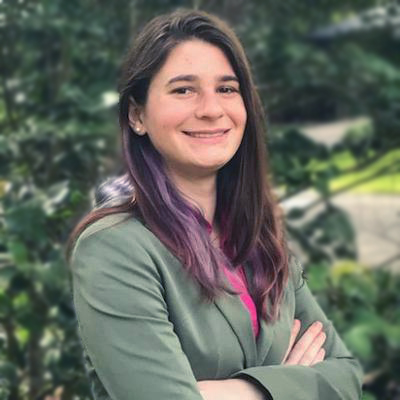
Jennifer "Ferby" Cremer
The Human:
I am a PhD candidate in Computer Science - Graphics and Visualization at the University of Florida. I work in SurfLab under the supervision of Dr.Jorg Peters. My work focuses on human perception of complex 3D data (specifically medical imagery) in virtual reality, to both enhance spatial reasoning about the given structures and provide fast yet accurate representations without specialized software training.
For this multi-disciplinary project Dr.Eric Ragan is the co-chair for my committee and key advisor for the user studies of the project.
I have also been a part of the Academy Software Foundation's (ASWF) D&I Working Group since 2020; particularly involved with the Summer Learning Program.
I spent the first few years of graduate school experimenting with teaching. I had the opportunity to teach undergraduate electives -- Design Patterns for Object-oriented Programming, Performant Programming in Python -- and work under the direction of Dr. Jeremiah Blanchard as the Lead TA for Operating Systems.
Since being awarded the Research in Robotic Technology Grant - Research Foundation of the ASCRS in the Summer of 2021, I was able to step back from teaching for a while to solely focus on my thesis project and get back into some of my rejuvenating hobbies like wildlife photography, painting, and go for adventures. Check out the Hobbies page to see more. I often reflect on the interfaces I encounter in my artistic activities when designing feature sets or communicating ideas to my advisors.
Publications
[Conference Paper]
Cremer, J., Lausch, C., Peters, J., and Ragan, E. (accepted, 2025). Empirical Study of Virtual Reality and Desktop Systems for Qualitative Editing of 3D Meshes: Impacts of Expertise and Context ACM Symposium on Virtual Reality Software and Technology (VRST). p 1-10. (View Abstract)
[Poster]
Cremer, J., Lausch, C., Peters, J., Terracina, K., and Ragan, E. Improving Radiology Communications and Patient Trust with Virtual Reality. ACM Symposium on Virtual Reality Software and Technology (VRST). Poster extended abstract. p 1-2. (View Abstract)
[Poster]
Benda, B., Cremer, J., Fang-Wu, J., and Ragan, E. Detection of Translation Gain is Decreased When Virtual Reality Users Are Unaware of Its Presence. ACM Symposium on Virtual Reality Software and Technology (VRST). Poster extended abstract. p 1-2. (View Abstract)
[Doctoral Consortium]
Jennifer Cieliesz Cremer. Scan2Twin: Virtual Reality for Enhanced Anatomical Investigation. IEEE Conference on Virtual Reality and 3D User Interfaces (IEEE VR 2024) Doctoral Consortium. (Link) (View Abstract)